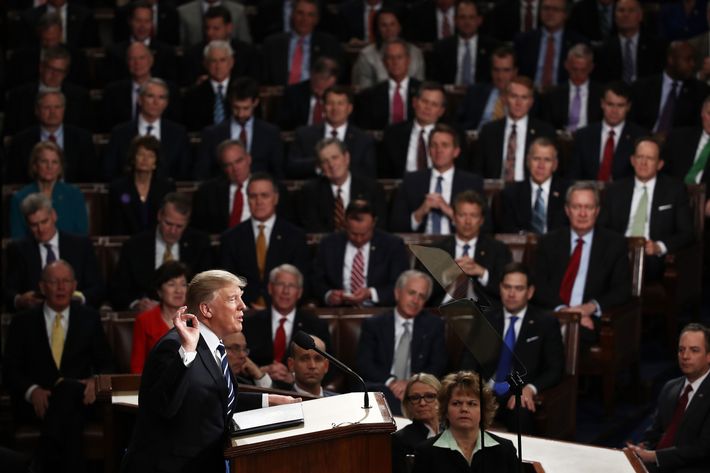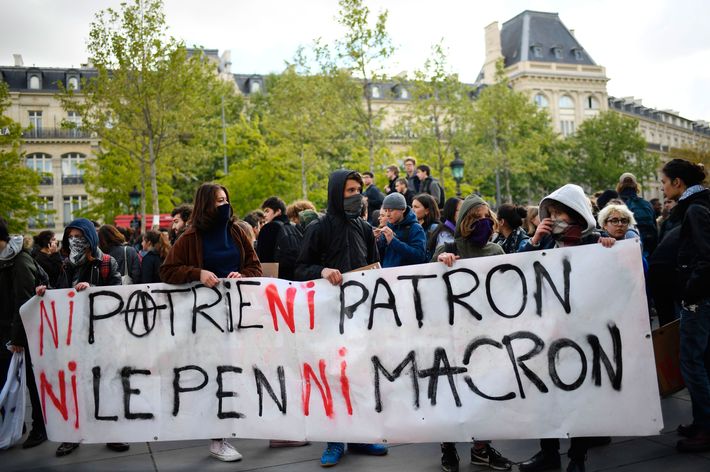
A confession: I’m much less afraid of Trump than I was a year ago. His rhetoric, his unfettered far-right agenda, his love of violence, and his loathing of constitutional limits during the campaign were indeed things to be terrified by. They still are. But those of us who were worried that the Constitution might not hold, and that liberal democracy was teetering on the edge of implosion, have so far, mercifully, been proven wrong.
The Founders turn out to have constructed a system designed to confront exactly this kind of despotic figure — and it has held up well, even with total GOP control of House and Senate, even in this dangerously liquid, hyperdemocratic modern world. The press has done its job of fact-checking, exposing, and opposing those in power (yes, Mr. Bannon, that is one part of its function in a democracy). The courts have resisted strongly. The opposition has seen a dramatic uptick in political and civic engagement. Even Trump’s own congressional party has splintered, impervious to the charisma of their hood ornament. The American public has not been swept up in a nationalist fervor and has tilted against much of Trump’s agenda — on health care and immigration in particular.
Yes, the Trump base remains invested in their antihero. In the poll of polls, he hasn’t dropped below 40 percent for more than a fraction of his time in office. And yes, he still taps into the most powerful currents in the world right now. But his overall popularity is still shockingly low for a newly elected president. And his sad lack of substantive legislative achievements has revealed the talk-radio politics of the far right are incapable of forming a coherent governing agenda.

I keep thinking of how Obama kept predicting during his eight years of frustration that at some point the “fever would break” on the right. It never did. But history is an ironist. It turns out that the only way the fever could ever have broken is if the GOP actually got complete control of the government and … couldn’t do much of anything. The bluff has been extravagantly called. It’s one thing to rail against the “disaster” of Obamacare; it’s quite another, it turns out, to replace it.
All the right’s political power, we can now see, depended on being in permanent opposition, and never having to actually implement something. Their tax cuts for the very wealthy are tone-deaf; their resuscitation of the Laffer curve surreal. They’ve got nothing on health care but a return to the highly unpopular status quo ante. And they are caught between Trump’s desire to borrow even more to finance his tax cuts and the GOP’s resolute insistence throughout the Obama years that the debt was an existential threat. It’s quite amazing to watch this unfold and unravel in real time.
And here’s the thing: My suspicion is that if Clinton had become president, the fever would not have broken at all; it would have intensified. Her incompetence and indecision would have given the GOP even more political oxygen; a Republican House would have stymied her even more effectively than it did Obama; her unfavorables would have gone through the roof; and it could have been an ugly death spiral for the Democrats. (The latest polls showing considerable dissatisfaction with Trump nonetheless show that in a rematch, he would actually do better today against Clinton than he did last November.)
Instead, we have a manifest and brutal exposure of the stark promises Trump made, and of the incoherence and shallowness of so much of the Republican agenda. I still would never have risked putting this menacing clown into the Oval Office. But in the long run, if catastrophe doesn’t strike, it might even be better for the future health of our politics that Clinton is not president. Maybe the American people are not so crazy after all.
Here’s the scorecard of Trump’s first 100 days.
The Clinton counterfactual also makes me worry about Emmanuel Macron and France. He’ll almost certainly win — but his victory could well be pyrrhic. Why? Because his persona, background, and agenda are almost designed to polarize France still further, and thereby empower the reactionary right still further. He is not a centrist candidate on the core issues — the EU, immigration, Islamist terror, and national identity. He actually wants to accelerate European integration, he has attacked the notion that mass Muslim immigration is a problem for France, he embraces Angela Merkel’s impulsive invitation to more than a million Syrian refugees to come and live in the EU, he has called Islamist terrorism something to be lived with (even as France remains in a state of emergency), and he favors more Western involvement in tackling the chaos in the Middle East.

He is also a walking stereotype of the very globalist elites that many French have come to see as the enemy. A cute, cosmopolitan former banker who favors continuing many of President Hollande’s policies (but with more emphasis on the free market), he cannot help but be seen as the globalist candidate par excellence in a France increasingly drawn to nationalism. Forty-six percent of the vote in the first round went to candidates who were skeptical of free-market economics and the EU.
So we must fervently hope that Macron is able to have a successful presidency. Because if he fails — and he has no party in the assembly to lean on — Le Pen is waiting again in five years’ time. If the white regional working poor in France see no improvement in their lives, if the idea of traditional France continues to evaporate, and if the economic and social divide between the cognitive elite and the working poor deepens further, then what we are seeing now may be a pale version of the backlash ahead. Maybe I’ve read too much Michel Houellebecq, or maybe I’m too persuaded by the analysis of Christopher Caldwell, but I worry about the growing barometric political pressure in France. A Macron victory may not prevent, but merely postpone the deluge.
I’ve always felt a little insecure about my homosexuality because I’ve never really understood camp. Well, I do understand it as a concept; it just doesn’t come naturally to me. I remember one of my ex-boyfriends once excitedly inviting me to watch Mommie Dearest with him, the legendary movie about the crazy mothering of Joan Crawford, played by Faye Dunaway in a tour de force of melodrama that all but killed Dunaway’s career. It was a long time ago, and I was even less acculturated to gay culture than I am now. And as my boyfriend collapsed into fits and hoots of laughter as Ms. Crawford traumatized and terrorized her daughter Christina, I was merely shocked and horrified. I was watching a movie about the most hideous child abuse. And yet I was supposed to find it hilarious.
Of course, I now laugh at it. But the laughter still makes me uneasy. And the great merit of the just-concluded Ryan Murphy mini-series, Feud, on the epic, brutal battle between Bette Davis and Joan Crawford, is that, while it has many camp elements, it’s actually a movingly sympathetic account of two ultimately wounded, desperate, and lonely women. Their mutual struggle against Hollywood’s brutal sexism, the sheer pathos of their late careers, the depth of the pain that led to such fathomless mutual cruelty: The writers somehow brought these to nuanced and riveting life. Jessica Lange’s performance might even help us see Crawford’s talent and body of work beyond the Mommie Dearest cartoon. I’m grateful for this. It’s humane in a way camp often isn’t.
I know that identification with glamorous divas who are dying inside has long been an act of empathy for many gay men over the decades. I see how that dynamic vents some of the pain and exclusion that homosexuals have long experienced and endured. But there is also a streak of cruelty in the mocking of female desperation that the response to movies like Mommie Dearest reveals. It’s the final iteration of Oscar Wilde’s remark that “One must have a heart of stone to read the death of Little Nell without laughing.” But at least Wilde’s quip was really directed at Dickens’s sentimentalism, rather than at an actual little girl dying. I wish I could say the same about how camp evolved in the following century as well.
It’s why I cannot watch the Real Housewives franchise. It seems to me to take the cruelty of camp and direct it to fame-desperate and psychologically damaged wealthy women. The audience is not even laughing at characters in movies any more. They are laughing at real women as they descend into cat fights, drug abuse, absurd plastic surgery, brawls, and mutual hatred. Yes, laughing. I know these women willingly accept this brutal bargain: fame in return for mockery. But they are also human beings, mortgaging their souls to the guffaws and cackles of gay men and for the exploitative enrichment of Andy Cohen.
Maybe as the pain of being gay recedes somewhat in a more inclusive America, camp may soften, and its misogynistic callousness wither as well. That’s the promise of Murphy’s achievement. At some point the mixture of cruelty and sympathy that has defined camp for so long may evolve into something less brutal and more forgiving. But then it would no longer really be camp, would it?
See you next Friday.





























